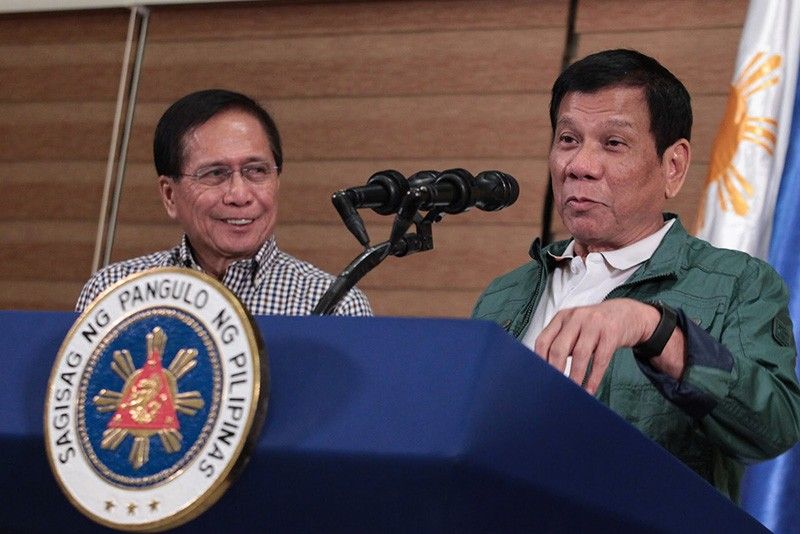Peace talks called off for military operations, CPP claims

MANILA, Philippines — The Communist Party of the Philippines on Sunday claimed that the Duterte administration cancelled the resumption of peace negotiations to give to an all-out military offensive against the New People’s Army across the country.
"By calling off the scheduled peace negotiations with the [National Democratic Front of the Philippines], Duterte aims to give the [Armed Forces of the Philippines] more time to complete its military campaign plan for 2018 of mounting bigger offensives under Oplan Kapayapaan in the hope of crippling the [New People's Army] and inducing the NDFP to negotiate a surrender," said in a statement.
The Armed Forces of the Philippines said in January when it adopted Development Support and Security Plan Kapayapaan, that it will serve as a blueprint for how the military will operate. Under the plan, the military will conduct focused combat operations and "stakeholder engagement" for support and participation from the religious sector and from local goverments.
Duterte canceled the scheduled talks with the National Democratic Front of the Philippines saying he needs more time and that he is not ready for it. The resumption of peace negotiations was initially scheduled on June 28 to 30.
Prior to Duterte’s pronouncement, Presidential Adviser on Peace Process Jesus “Jess” Dureza already announced that planned resumption of talks had been called off.
"It should not be that we only engage the other [peace] table, which is the rebel group, and then ignore the bigger table. If it is not supported by the public, nothing will happen," Dureza said in a report on state-run Philippine News Agency. "We have to go and listen to the public."
The government’s move upset the CPP.
The CPP said that the government’s move to defer the scheduled talks with NDFP occurred after the president was briefed on the status of Oplan Kapayapaan in a meeting with the top brass of the AFP and defense officials.
The communist party added that Defense Secretary Delfin Lorenzana has publicly announced that the military wants three to six more months before the government resumes talks with the NDFP.
"Clearly, Duterte does not want the AFP's military campaign plan disrupted by the peace talks," the CPP said.
'Large-scale offensives underway'
According to CPP, the AFP is already mounting large-scale offensives nationwide including several hundred rural barangays. It added that the AFP has recruited at least 5,000 soldiers and will recruit 10,000 more troops until the end of the year.
The CPP said the government is using its brute force to target civilian populations, occupy schools and barangay halls, as well as unarmed people.
"The AFP carries out aerial bombings, artillery shelling, drone flying and other methods of intimidating the masses," the CPP cited.
"Extrajudicial killings and other grave abuses of human rights and international humanitarian law run rampant. Tens of thousands of peasants and national minority groups have been forced to leave their lands," it added.
Dureza earlier defended the “resetting” of the peace negotiation saying history shows many peace deals that suffered setbacks due to lack of public support.
“The resetting of the planned peace talks is exactly for the purpose of protecting the gains achieved in the backchannel talks prior to formal resumption of peace negotiations,” Dureza said Friday.
NDFP releases 'stand-down agreement'
Jose Ma. Sison, CPP founding chairman and chief political adviser to the NDFP, said the government’s move was “disappointing and frustrating.” He earlier urged both panels to make public the stand-down agreement signed on June 8.
The CPP released the supposed stand-down agreement showing the preparations for the resumption of peace talks, which Sison signed as NDFP chief political consultant. It was signed on June 8, 2018 in Utrecht, The Netherlands.
The two-page agreement stated that there should be temporary cessation of hostilities and work on measures to prevent the escalation of hostilities that may arise from certain incidents.
“Any movement of the respective armed troops and personnel of any party which may be considered as a provocative and or hostile act must be avoided," the agreement read.
Among the signatories of the stand-down-agreement were GRP Panel Chair Silvestre Bello III, NDFP Panel Chair Hernan Braganza.
Members of both parties Hernani Braganza, Angela Librado Trinidad, Julieta De Lima, and Asterio Palima also signed the agreement.
The signing of the deal was signed by witnesses GRP Ceasefire Committee Chair Francisco Lara Jr., NDFP legal consultant Rachel Pastores and Norwegian Ambassador Idun Tvedt, Norway's special envoy to Philippine peace process.
“This agreement has been unilaterally scrapped by the (government). And the press and public wish to know why. They also want to know the contents of agreements signed on June 10, 2018 pertinent to the June 28-30 resumption of formal peace talks and the interim peace agreement which have been unilaterally cancelled by the (government),” Sison said.
—Rosette Adel
- Latest
- Trending






























